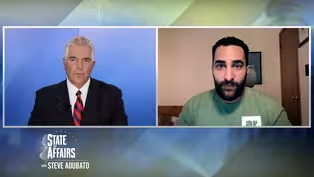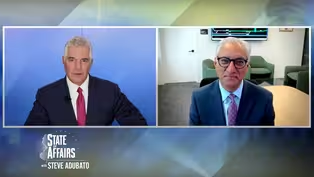State of Affairs with Steve Adubato
Addressing the key issues shaping the race for NJ governor
Clip: Season 9 Episode 13 | 10mVideo has Closed Captions
Addressing the key issues shaping the race for NJ governor
Steve Adubato speaks with Benjamin Dworkin, PhD, Director of Rowan Institute for Public Policy & Citizenship (RIPPAC), about the key issues shaping New Jersey’s gubernatorial race and ways to preserve and protect our democracy.
Problems playing video? | Closed Captioning Feedback
Problems playing video? | Closed Captioning Feedback
State of Affairs with Steve Adubato is a local public television program presented by NJ PBS
State of Affairs with Steve Adubato
Addressing the key issues shaping the race for NJ governor
Clip: Season 9 Episode 13 | 10mVideo has Closed Captions
Steve Adubato speaks with Benjamin Dworkin, PhD, Director of Rowan Institute for Public Policy & Citizenship (RIPPAC), about the key issues shaping New Jersey’s gubernatorial race and ways to preserve and protect our democracy.
Problems playing video? | Closed Captioning Feedback
How to Watch State of Affairs with Steve Adubato
State of Affairs with Steve Adubato is available to stream on pbs.org and the free PBS App, available on iPhone, Apple TV, Android TV, Android smartphones, Amazon Fire TV, Amazon Fire Tablet, Roku, Samsung Smart TV, and Vizio.
Providing Support for PBS.org
Learn Moreabout PBS online sponsorship[INSPRATIONAL MUSIC STING] - Hi everyone, Steve Adubato.
We kickoff the program with our good friend and colleague, Dr. Benjamin Dworkin, who's director, as you can see behind, of the Rowan Institute for Public Policy and Citizenship.
Rowan University, one of our longtime higher ed partners.
Good to see you, my friend.
- Good to see you, Steve.
Thanks for having me.
- Yeah, a lot of folks saw you on election night, "NJ Spotlight News", election night coverage NJ PBS.
Great stuff.
Now we go beyond the election.
Number one issue, Dr. Dworkin, that you believe is gonna influence voters in this race for governor in the great state of New Jersey, one of two races for governor in the country after Donald Trump became president, New Jersey and Virginia.
Go ahead, Ben.
- There are actually three top issues, but I think if you had to pick one as the number one, it's gonna be change.
We've had eight years of a Democrat Phil Murphy in as the governor, and the question is how much of a change do we want?
Do the voters want?
Typically, New Jersey voters do not give a third term to one party in terms of voting for governor, but this could be the year that that is different.
And that's why you saw both candidates, Jack Ciattarelli, the Republican nominee, Mikie Sherrill, the Democratic nominee on election night in their victory speeches talking about "We are the change, "they're the status quo".
- So it was unfair of me to ask for one issue.
You obviously, if it's two or three issues, affordability right up there, right, Ben?
- Sure.
Affordability and Donald Trump are the other two big issues.
- Donald Trump is an issue?
- Trump will be an issue.
He's a huge factor.
- Do affordability first.
Do affordability, then we'll go to Trump.
Go ahead.
- Okay, so affordability is almost always an issue in New Jersey.
The fact is it's expensive to be here.
Both parties know it.
Both parties have been trying to address it in their own ways.
Republicans talk about cutting government and they wanna get rid, you know, why they wanna replace the Murphy administration.
Democrats keep coming up with new ways to reduce property taxes, usually through some kind of rebate or check that you get from the government.
These are gonna be part of the issues, but affordability relates more to the just taxes.
It's about affordability in housing, affordability in college education, just general, the cost of living, this is gonna be a major theme in this upcoming election.
- And before we go to Donald Trump, our president, the president, how much impact do you believe a governor has on people's ability to, quote, unquote, afford living in this state?
- In some ways, the governor has a tremendous ability.
The fact is, you know, spending in this state is a direct impact on what people can afford or do.
And there are different ways of doing that.
So if you're a small business owner and the governor comes forward and pushes forward for an increase in the minimum wage, you'll say that's making New Jersey more affordable.
If you are the person who's working in a restaurant and suddenly is able to get 15 or $16 an hour, you're thinking, "This is great.
This makes New Jersey more affordable."
- But, Ben, what does it do to the business owner who's arguing, "I can't afford it"?
- Yeah, I mean, but that's why we have campaigns, that's why we have elections to debate exactly those issues.
Because there are plans out there.
The governor can shape the agenda, can shape the legislation policies, but those policies can help some people and hurt other people.
- Let's put President Donald Trump and his presidency in context with this race for governor.
Please, Dr. Dworkin, go ahead.
- Look, the most recent poll, which is from May, showed us that Donald Trump, at that time, had a 47-47 approval rating, 47 approve, 47% disapprove.
This is not the worst kind of thing.
Now, a lot of people assume because New Jersey has been so blue for so long in federal elections, because Donald Trump has run here three times and lost every single time, they think and believe that his presidency will be a drag on the Republican ticket, especially because the Republican, Jack Ciattarelli, was so outgoing in terms of getting the endorsement, they were showing it off as opposed to running from it.
But what really is gonna happen is that people don't vote today.
They're gonna vote, you know, seven weeks out as we begin our election season.
So the question about what kind of effect Donald Trump will have on this race for governor really depends on how popular he is, how the economy, the national economy, is doing when we hit October.
- Or also as we do this program in mid, late June, or international affairs could impact New Jersey as well.
But lemme try this, Ben.
To what degree do you believe, because the Institute for Public Policy and Citizenship is so important, this concept of citizenship, being an active citizen, Professor Eddie Glaude over at another university at Princeton wrote a wonderful book called "We Are the Leaders We've Been Looking For".
In that spirit, some people might think it’s an esoteric, academic question, but Ben, you and I talk about this all the time, the graphic will come up right now, Democracy in Danger.
To what degree do you believe our representative democracy is in danger, especially if citizens assume somebody else is gonna preserve our democracy?
I know that's not a simple question about tax policy.
- You have to take ownership.
- Go ahead.
- I'm sorry.
But everyone has to take ownership.
It's an old line.
No one ever washes a rented car because nobody takes responsibility for the rented car.
That's not democracy.
Democracy is something you have to take ownership of, and every citizen, the incredible thing that our founding fathers created in this country was an opportunity for every citizen to say, "I own a piece of this.
I own a piece of this great American experiment."
So it's frustrating when only 30% of Democrats and registered Republicans come out and vote in this past June primary.
It'll be frustrating when only 55% or so, 50, 55% of registered voters, of all registered voters will vote in this upcoming November election for governor and for the state assembly.
People have to take ownership of it, the threat to democracy and to the Great American experiment, as Abraham Lincoln described it, is always there.
And perhaps we are focusing on it more now than before.
And that's probably good.
And I think we need to, but the way to counter this is because we still have the vote.
People have to take ownership of what's going on in the country and hold their elected officials accountable.
- One more quick follow up, Ben.
Your understanding, your perception of our role as independent folks in media as it relates to preserving this precious representative democracy, Ben?
- A couple different things.
First of all, we have to be able to tell a story in a way that people understand.
And sometimes these are big concepts and they're complicated policies.
I described sort of the debate over minimum wage.
It can hurt some people, it can help some people, but that's the media's, I think the media has to be seen as somebody who's reliable and fact driven.
There is so much misinformation, particularly because of the rise of social media, which made everyone with a cell phone their own media outlet, and people who are followers for, you know, like, "Ooh, this is what they are saying."
Who's they?
- Okay.
- We all have a real responsibility to do that.
I know at Rowan, you know, we bring down, we had every major candidate on the Republican and Democratic side come and speak on campus, address questions from our students, from the audience.
And I think that's the way we contribute to a higher level of political discourse.
- Well said, my friend Dr. Benjamin Dworkin, director of the Rowan Institute for Public Policy and Citizenship.
Thank you, Ben.
We'll talk again soon.
- Thank you, Steve.
- You got it.
Stay with us, we'll be right back.
- [Narrator] State of Affairs with Steve Adubato is a production of the Caucus Educational Corporation.
Funding has been provided by The Russell Berrie Foundation.
RWJBarnabas Health.
Let’s be healthy together.
Valley Bank.
Delta Dental of New Jersey.
PSEG Foundation.
New Jersey Manufacturing Extension Program.
The New Jersey Economic Development Authority.
Congress Hall.
A Cape Resorts property.
And by IBEW Local 102.
Promotional support provided by Meadowlands Chamber.
And by New Jersey Monthly.
- (Narrator) Public service.
It's what we do, at the PSEG Foundation Through volunteer hours, partnerships and our other contributions.
We're committed to empowering communities.
We work hand in hand with you, our neighbors, to educate young people, support research, environmental sustainability and equitable opportunities, provide training and other services all over New Jersey and Long Island.
Uplifting communities.
That's what drives us.
The PSEG Foundation.
How this non-profit assists the homeless population in NJ
Video has Closed Captions
Clip: S9 Ep13 | 8m 47s | How this non-profit assists the homeless population in NJ (8m 47s)
President of NJ Transit talks about service & reliability
Video has Closed Captions
Clip: S9 Ep13 | 9m 39s | President of NJ Transit talks about improving service & reliability of public transit (9m 39s)
Providing Support for PBS.org
Learn Moreabout PBS online sponsorship
- News and Public Affairs

Top journalists deliver compelling original analysis of the hour's headlines.

- News and Public Affairs

FRONTLINE is investigative journalism that questions, explains and changes our world.












Support for PBS provided by:
State of Affairs with Steve Adubato is a local public television program presented by NJ PBS

